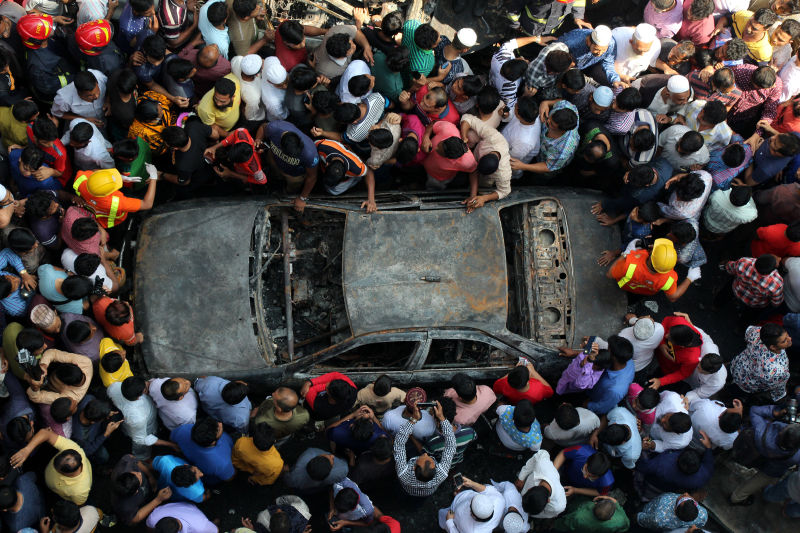 Winner: 'Fire Incident', by Syed Mahabubul Kader
Winner: 'Fire Incident', by Syed Mahabubul Kader 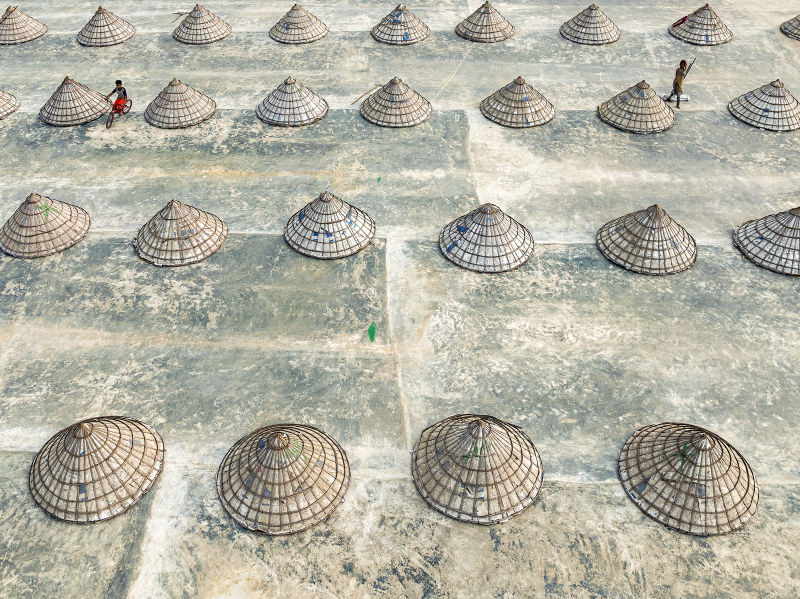 Shortlisted: “Life in a Rice Mill”, shot by Asker Ibne Firoz
Shortlisted: “Life in a Rice Mill”, shot by Asker Ibne Firoz 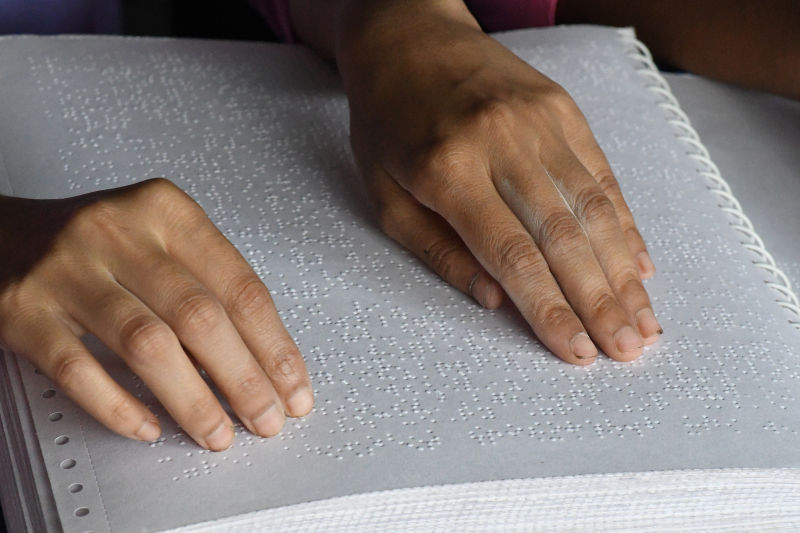 Shortlisted “Limitations”, by Srimanta Ray
Shortlisted “Limitations”, by Srimanta Ray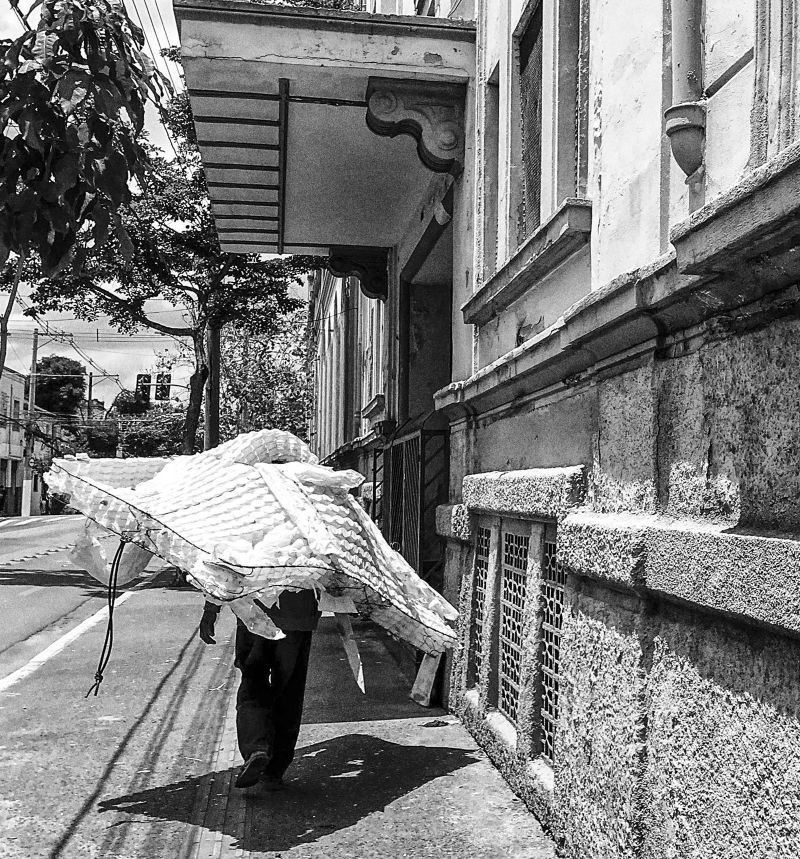 Shortlisted: “Bed and table”, by Rose Battistella
Shortlisted: “Bed and table”, by Rose BattistellaCatch up with the latest news from WIRI.
Being aware of social inequalities and their pervasive effect on well-being and societal functioning is pivotal to the development of a solution. However, social inequalities and disadvantages are often hidden from our eye or difficult to pinpoint if we have not experienced them first-hand. Similarly, their long-term negative effects on both single individuals and society as a whole, are not immediately and easily perceived without the support of rigorous research.
(UN)PRIVILEGED, a project born from the collaboration between Women in Research Ireland (WIRI – charity No: 20200957) and the Equality Fund in Trinity College Dublin, aimed to raise awareness of the multifaceted nature of social inequalities and their consequences.
To achieve this, (UN)PRIVILEGED tackled this issue combining the points of view of arts and science. In the past months, WIRI ran a photo contest asking contestants to capture through their lens the gap between privilege and disadvantage. The contest was an international success, with 59 entries from 10 different Countries worldwide including Bangladesh, India, Moldova, United Arab Emirates, and Brazil. The entries were evaluated by a panel composed of professional photographer Mark Nixon, WIRI committee member Cathy Corcoran, and Trinity researcher Anna Truzzi.
The winning and shortlisted photographs, attached to this article, were printed and showcased during a free in-person award ceremony which took place on Thursday June 30th in Trinity College Dublin. During the award ceremony, Prof. Yekaterina Chzhen, assistant professor in Sociology at Trinity College Dublin and world-renowned expert on poverty and inequality across the life course, presented her research results about the longterm effects of social inequalities on individuals and society. This was followed by the announcement of the winner of our photographic contest selected by our panel of judges.
The winning picture, shot by Syed Mahabubul Kader in Dhaka, Bangladesh, and titled “Fire Incident” portrays people surrounding the remains of a car previously engulfed in flames from a fire attributed to illegal storage of chemicals in unregulated warehouses, highlighting how living in a healthy place is a privilege not shared by all human beings. The other shortlisted photographs portrayed different perspectives of social inequalities. “Life in a Rice Mill”, shot by Asker Ibne Firoz in Bangladesh, highlights how gender gap has roots in childhood by showing a girl working while a boy from the same family plays riding a bicycle. “Limitations”, shot by Srimanta Ray in India, highlights how having special education needs can be a sharp disadvantage for the individuals if those needs are not recognized or met. “Bed and table”, shot by Rose Battistella in Brazil, shows some indirect economic consequences of Covid-19 which contributed to deepen the gap between opposite ends of the socio-economic status.
By showcasing the photos and reporting scientific results about long-term consequences of disadvantage in our society, (UN)PRIVILEGED aimed to give its audience a moment to reflect, promoting awareness and maybe prompting people to strive to reduce social inequality in their everyday life by taking actions, even small ones.
We are grateful to all the photographer who participated in the contest and to Trinity College Equality Office for sponsoring both the photo contest and the award ceremony, allowing us to develop such an innovative and impactful project.
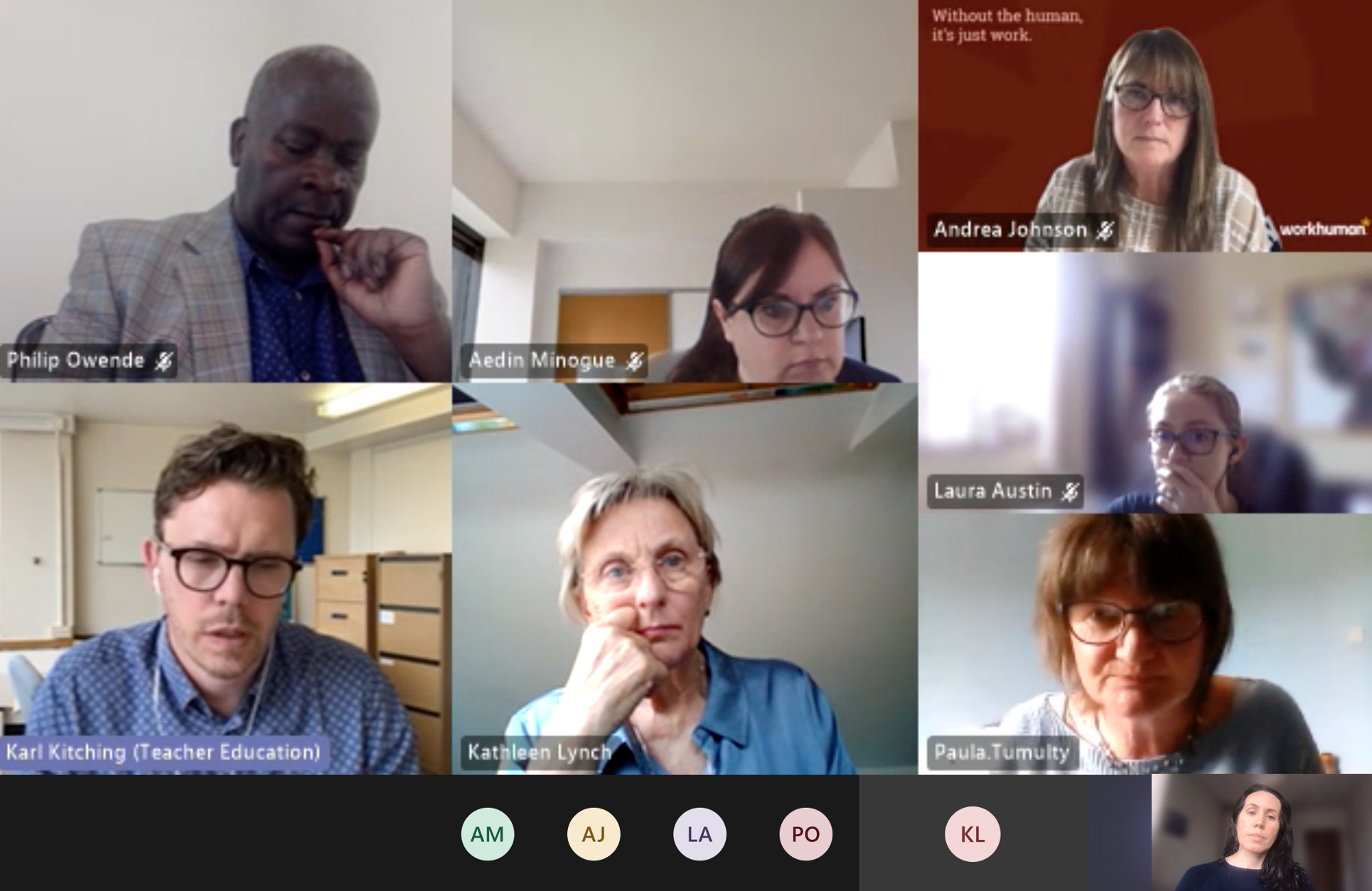
As an organisation committed to gender inequality and focused on supporting women and minorities in academia in Ireland, WIRI (Women in Research Ireland) is involved in a variety of activities related to promoting gender equality measures in the higher education sector.
On 9 June 2022, WIRI was invited to address the expert group in charge of the Second Review of Gender Equality in Irish Higher Education Institutions (HEIs), which is ongoing until October 2022. This review is evaluating progress on gender equality since 2016, analysing progress to date.
Representing WIRI in the online meeting, WIRI’s Co-director, Dr Valesca Lima offered insights on the issue of gender equality amongst higher education staff and progress made towards advancing gender equality since the first review, released in 2016. In particular, she highlighted some recent advances, such as the increasing availability of disaggregated data, the implementation of gender quotas at the governance and management level, the creation of the SALI (Senior Academic Leadership Initiative) program and the tying research funding with gender equality by funders like the Irish Research Council.
Despite discreet advances, some areas are still seeing little progress. Dr Lima highlighted that women's academic career progression remains very slow. For example, 18% of professors were female in 2013, in 2020 it had only increased to 27%. On this she commented:
‘HEIs have invested in promoting gender parity at the highest levels, but some structural barriers remain'.
The issue of precarious jobs in academia was also discussed. Dr Lima highlighted that women and ethnic minorities are over-represented in precarious academic jobs, occupying 71% of temporary part-time academic positions. This precariousness has an impact on migrant academics, who in addition to facing low wages and discrimination, have to deal with the challenge of finding a stable job. To close the meeting, the group of experts requested that the 'big asks' or high level goals be included in the second review. Dr Lima explained that these big demands must involve new policies for retaining women in the academic labour market, a better financial structure oriented towards gender equality and the end of the extreme dependence on temporary and precarious employment in the Irish third level.
The consultation event was also attended by representatives from the Irish Precarity Network and Women in Technology and Science Ireland, and Professor Kathleen Lynch, in addition to members of the Expert Group, Dr Karl Kitching and Dr Philip Owende.
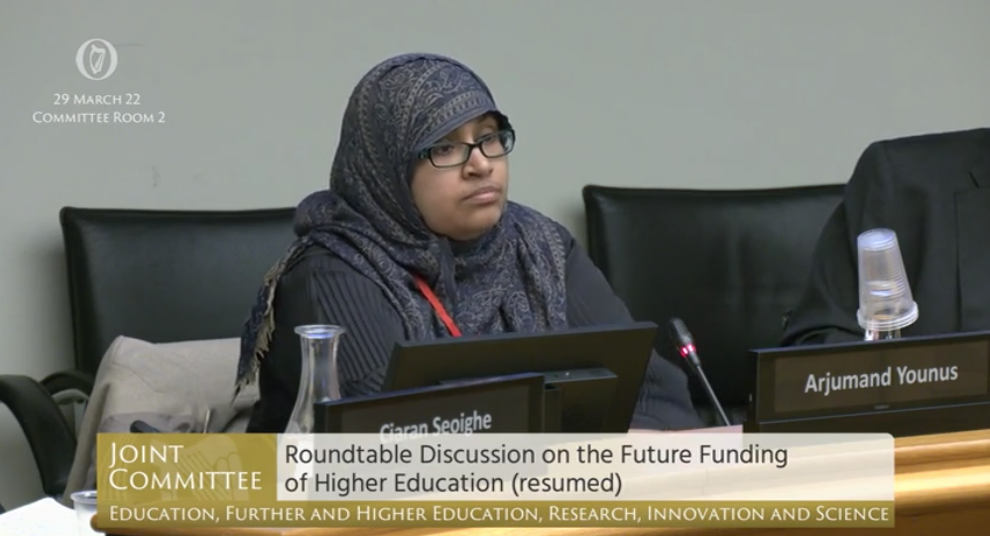
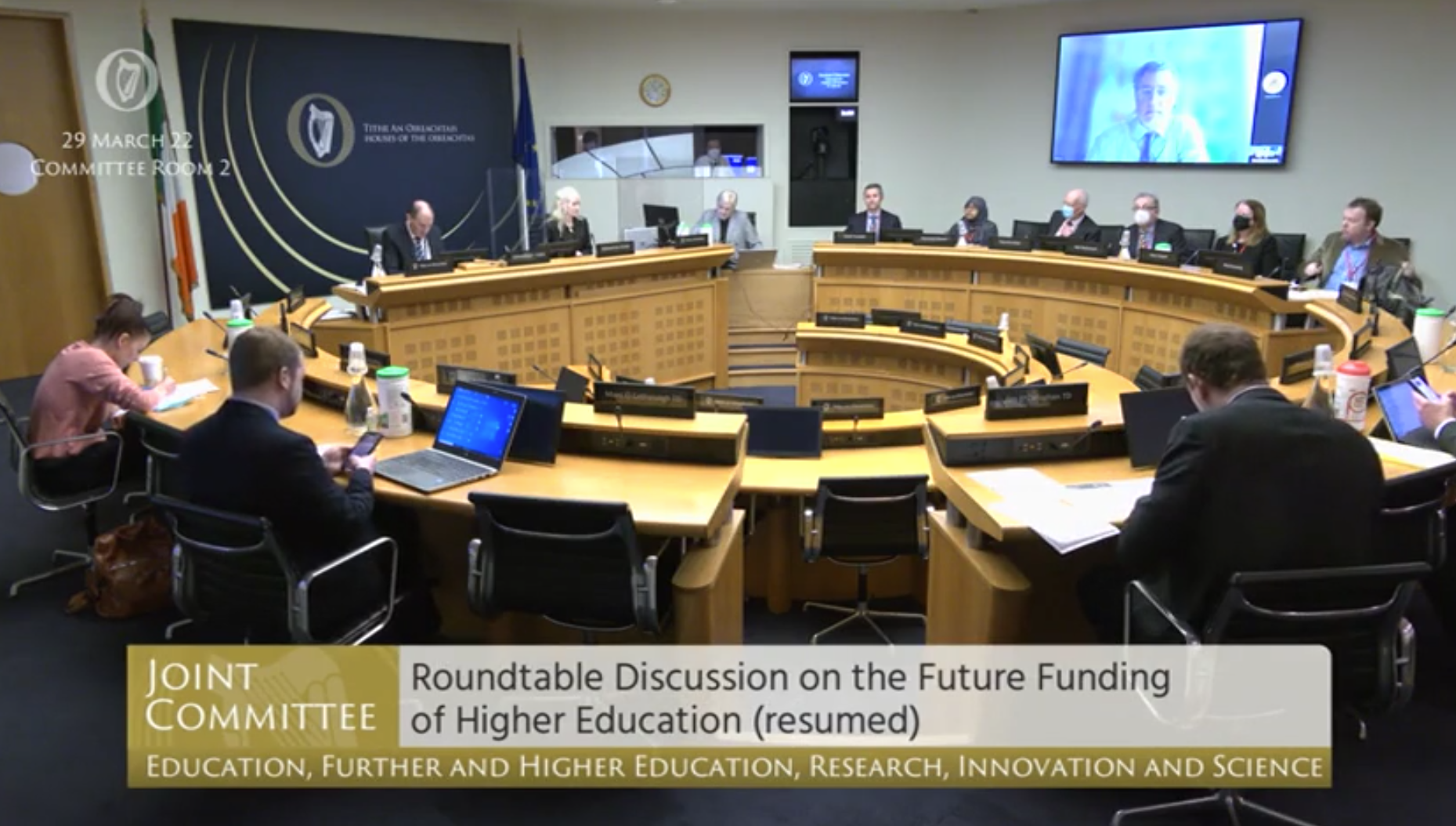
WIRI addressed the Joint Committee on Education, Further and Higher Education, Research, Innovation and Science on Tuesday 29 March 2022.
On Tuesday 29 March 2022, WIRI’s co-director Arjumand Younous addressed the Joint Committee on Education, Further and Higher Education, Research, Innovation and Science roundtable on the future funding for higher education. Drawing from recent data, Dr Younous discussed the future funding for the Irish third level, focusing on issues related to the impact of the funding crisis in higher education on women and minority groups.
WIRI was joined on the occasion by other entities active in the defence of a research system with long-term and stable funding, such as Irish Research Council (IRC), the Science Foundation Ireland (SFI), the Economic and Social Research Institute (ESRI); and the Irish Precarity Network.
In its statement, WIRI highlighted the need for the creation of permanent, project-independent positions and professorships in higher education institutions that demonstrate gender and racial equality. In particular, WIRI called for the collaboration of all research stakeholders to improve the governance and management of research careers and promote inclusion and diversity in Irish higher education.
Links:
2. Full streaming of the Joint Committee
3. Full transcript of the Future Funding of Higher Education on Discussion on 29 March 2022
Women in Research Ireland stands in solidarity with those fleeing Ukraine and strongly
condemns Russia’s brutal invasion of the country. We call on Russia to immediately
withdraw its forces and end this illegal occupation of a sovereign state.
Russia has created a humanitarian catastrophe of apocalyptic proportions. Every day, those
fleeing Ukraine are forced to seek shelter from the indiscriminate bombardment of their
civic spaces. Many have been forced to flee into neighbouring states as refugees.
Our governments must provide a safe haven for all refugees. They have a basic human right
to security, shelter and dignity. The most vulnerable people urgently need provisions,
protection and financial assistance.
As a platform for women in research, advocating rights and policies for the advancement of
women academics, WIRI expresses its solidarity with academic women fleeing Ukraine.
Russian threats of violence and death have led to a mass exodus of scientists and
academics. This is not only an attack on academic freedom and opportunities for scientific
cooperation, but also on the principles of freedom and democracy that provide the basis for
international research.
WIRI firmly believes that the advancement of scientific knowledge and innovation is based
on a stable global order and peaceful collaboration among scholars of all nations. We call on
the international community to strongly condemn Russia's armed aggression and work
towards an end to this violence.
Below are some helpful resources on how you can help recently arrived refugees from
Ukraine in Ireland and beyond:
Ukrainian crisis: How you can help (by the Immigrant Council of Ireland):
https://www.immigrantcouncil.ie/news/ukrainian-crisis-how-you-can-help
Irish Refugee Council: https://www.irishrefugeecouncil.ie/ukraine-information-note
Scholars at Risk (for Ukrainian scholars and practitioners seeking support):
https://www.scholarsatrisk.org/in-solidarity-with-ukraine/ and
https://www.scholarsatrisk.org/resources-for-at-risk-individuals-from-ukraine/
Science for Ukraine (directs Ukraine to universities providing paid jobs and
accommodation): https://scienceforukraine.eu/about.html
Irish University Sanctuaries: https://ireland.cityofsanctuary.org/universities-and-colleges-of-
Support from Irish Universities:
DCU: https://www.dcu.ie/commsteam/news/2022/mar/dcu-statement-invasion-ukraine
UCD: https://www.ucd.ie/students/services/supportforukraine/
TCD: https://www.tcd.ie/news_events/articles/trinity-condemns-invasion-of-ukraine/
TU Dublin: https://www.tudublin.ie/explore/news/tu-dublin-crisis-support-fund.html
The Joint Committee on Education, Further and Higher Education, Research, Innovation and Science have published its Report titled “Report on the Pre-Legislative Scrutiny of the Higher Education Authority Bill 2021” on Tuesday 28 September 2021. As part of the public consultation stage, WIRI submitted their recommendations, and this submission is acknowledged and listed in the final report.
The full text of WIRIs submission is printed below, to read the full report click the following link to the “Report on the Pre-Legislative Scrutiny of the Higher Education Authority Bill 2021” and the appendix contanining all submissions here, WIRIs submission is found on pages 157-158.
Response to Public Consultation on Reform of Higher Education Authority Bill
2021
Submission from Women in Research Ireland (RCN:20200957)
Women in Research Ireland (WIRI) is a registered charity based in Dublin and a group member of the National Women’s Council of Ireland. WIRI’s vision is to achieve equitable representation for women and minority groups in Irish higher education. WIRI’s mission is to unite and build an empowering diverse and inclusive community of underrepresented groups where all voices are heard in academic spaces. The WIRI committee welcomes the opportunity to provide a submission on the pre-legislative scrutiny of the General Scheme of the Higher Education Authority Bill, 2021.
1. Addressing the needs of staff in Higher Education
It is essential that the legislation directly addresses the importance of the needs of all staff in higher education in particular women and minority groups. The detrimental and disproportionate effects of the COVID-19 pandemic on the academic careers of women and minorities across the world are widely reported particularly for those with caring responsibilities (Deryugina et al. 2021). There is an urgent need to mitigate this damaging effect on the career progression of women and others who have been most adversely effected.
In Irish Higher Education Institutions, those on part-time temporary contracts are predominantly women. The Higher Education Authority Higher Education Institutional Staff by Gender Report highlights that in 2019, 26% of professor posts were filled by women as compared to 74% held by men. 52% of academics on full-time temporary contracts were female, while 71% of those on part-time temporary contracts were female. There is an urgent need for better career training and supports for staff on precarious temporary contracts (postdoctoral researchers, research fellows, teaching fellows). While the focus on student success is correctly a central focus of the General Scheme, we recommend that supports for staff success feature more strongly in the General Scheme (in Objects and General Functions of An tÚdarás).
2. Equality, diversity and inclusion for staff in Higher Education
The ethos of Women in Research Ireland is that equity and diversity creates a positive impact in Higher Education and furthers the enhancement of science, health-care and the wider society. To advance equality, diversity and inclusion in Irish Higher Education, issues such as workplace bullying, harassment, unfair management and an inadequate complaints system need to be explicitly addressed. There is a need for suitable mechanisms for gathering feedback on staff issues relating to the theme of equality, diversity and inclusion. We strongly recommended that a focus on equality, diversity and inclusion supports for staff in Higher Education features prominently within the upcoming General Scheme. We would be happy to engage further on any aspect of this submission. Further detail on
Women in Research Ireland can be accessed at www.womeninresearch.ie.
References
Deryugina, T., Shurchkov, O., & Stearns, J. E. (2021). COVID-19 Disruptions Disproportionately Affect Female Academics (Working Paper No. 28360; Working Paper Series). National Bureau of Economic Research. https://doi.org/10.3386/w28360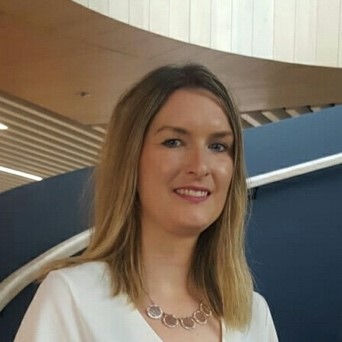
Dr Joanne Kenney
Co-Director Women in Research IE
30th March 2021
In celebration of International Women’s Day 2021, Women in Research IE were thrilled to host Professor Linda Hogan, Professor Jane Ohlmeyer and Professor Linda Doyle, the three candidates for the upcoming Provost elections at Trinity College Dublin. This marks a unique time in Ireland’s history as it will be the first time in Trinity's 429-year history that a woman will hold the position at Trinity College Dublin. Appallingly, the Republic of Ireland will be the last country in the European Union to appoint a woman as President of a University.
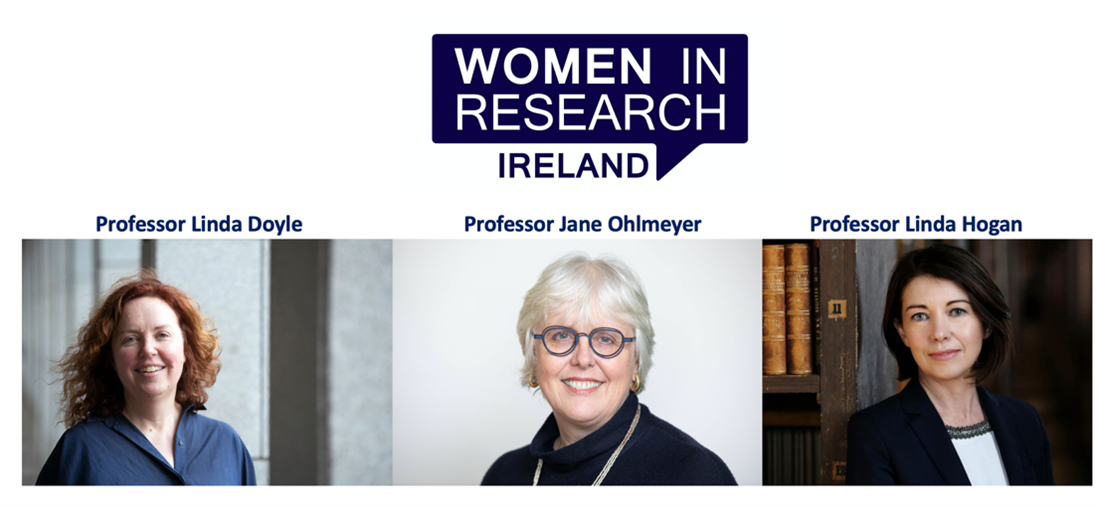
Kicking off the event Prof Linda Doyle stated that, “no matter what happens on April 10th we can be sure of one thing that Trinity will have its first woman Provost and perhaps George Salmon will be rolling in his grave forever more”. Provost Rev. George Salmon, who fiercely opposed the admission of female students to the University and whose statue is firmly rooted in Trinity front square, famously said during his term as Provost from 1888 to 1904, “over my dead body will women enter the college” (1). In Professor Doyle’s manifesto, Imagine Trinity she invites us to imagine the future we want at Trinity and to take action to realize that future (2). The two themes running through Imagine Trinity are power and fairness, themes which align with Women in Research IE’s own mission in building a united community where silenced voices are heard in academic spaces. Prof. Doyle says, “the Academy has always been structured to listen to some voices more than others” allowing a deeply unfair system to prevail in institutions throughout the centuries.
Second to speak was Prof Jane Ohlmeyer whose manifesto is titled, Empowering Trinity (3). Prof Ohlmeyer described to us her experience of falling pregnant with her first son while still doing her PhD at Trinity and the considerate support she received from her supervisor. She highlighted the necessity of a supportive supervisor and mentors during women’s career as well as the essential need for outstanding nursery care. Trinity still lacks important provisions for women with young children, for instance, only three breastfeeding rooms exist in the college (4). Prof Ohlmeyer reflected on the challenges she has faced in Trinity to address the conservatism, the hierarchy and in pockets, the misogyny that she has seen throughout her career. On her first day at Trinity as Erasmus Professor of Modern History in 2003, she recalls vividly the then Junior Dean asking why the new secretary was in the professor’s office. Prof Ohlemyer concluded by saying that, “Trinity has come a long way…but the truth is that we have a long, long, way to go”, stating that she is “almost embarrassed” that Ireland is the last country in the European Union to appoint a female as President of a university
Third up, we heard from Professor Linda Hogan, who discussed the importance of this historic election. She stated that our concepts of university leader and Provost are entirely determined by a male model, and that we have to re-imagine the Provostship itself as a “leader for cultural change”. Her manifesto is centered around this concept of living our values and this is what she says we must do in Trinity and academia generally (5). The principles in her manifesto focus on a culture that nurtures and that is driven by generosity of spirit and promotion of true equality and diversity. She also discussed the importance of mentors and supporters for women and minorities and “the valuing of women’s voices in academia”, as well as the need to address inequalities in the system to break the current mold and map a way for greater inclusion and diversity. In her manifesto, she also maps out a specific proposal about addressing bullying and harassment in our University as well as addressing precarious contracts of work.
Opening up the event to our attendees, we had several questions posed to the candidates.
The first question focused on the effect of the pandemic on the work of those with caring responsibilities.
Prof Doyle began by discussing the statistics that show the drop off in the numbers of women submitting for publication during the pandemic, which is particularly impacting early career researchers the hardest. The three candidates stated that the problem needs addressing from a systemic point of view. Prof Doyle stated that she is looking at a much fairer promotion system in the first place, designed to take into account maternity and paternity leave and disruptions to research more effectively. Prof Ohlmeyer referred to the Irish Research Council, the first council to fund costed extensions during the pandemic. She believes that the University can lead and do an awful lot more than it is currently doing. In Prof Hogan’s view the systemic response would focus on redress, that it is the only way we can deal with systemic and embedded inequalities. She also commented on the responsibility of the university as a workplace in supporting psychological well-being of its staff and students.
The next question from the audience asked the candidates about their support for PhD workers' rights.
Organisations such as PhD Workers' Rights Group are campaigning for workers' rights for PhD candidates across Ireland, similar to universities in Sweden where PhD candidates have a salary and other standard benefits of employment (6). Prof Doyle and Prof Ohlmeyer discussed the inequality of the tiered system that exists for PhD candidates where various different classes of PhD terms of work exist and the urgent needs to address this. Prof Doyle commented that we need better contractual certainty and obligations to PhD candidates to provide clarity around expectations of both them and supervisors. Prof Doyle and Prof Hogan both expressed their uncertainty about supporting workers' rights for PhDs with Prof Doyle stating that the research system isn’t adequately funded to increase the cost of PhD individuals as workers. She reinstated that a better approach for PhDs is to employ strong contractual obligation that are outside an employee type situation while still working to improve stipend situation. Both Prof Ohlmeyer and Prof Hogan commented that when it comes to any sort of improved conditions for early career researchers, we need to agree at a national level in order to have an understanding and a baseline of what are the acceptable conditions and minimum thresholds for all PhD candidates.
How would you leverage equality, diversity and inclusion and combat discrimination such as racism and homophobia on campus?
Prof Ohlmeyer emphasised her zero-tolerance approach to bullying, racism and homophobia in the University. She discussed her own experience of being trolled online and the need for creating an online environment where academic freedom is preserved. She commented that there are many policies in place at Trinity that aren’t implemented which needs addressing. Prof Hogan mentioned that Trinity and all universities should be bullying and harassment free zones. She discussed the inadequacies of the current complaints system at the university which she compared to best practices in Australian universities where confidential registers and meaningful investigations and penalties are in place.
Currently being a researcher is quite precarious at Trinity, it is often difficult for a postdoc to get funding and without a PI trying to get project funding your contract can end and there is no possibility of continuing in research at Trinity. Do you have any plans for creating a pathway to enable research careers at Trinity?
Prof Ohlmeyer believes that we need to create additional opportunities for our early career researchers in Trinity and across Ireland, that universities need to be thinking about wider career advice for these researchers. There is a need to better prepare this group for the workplace, such as creating opportunities for internships in enterprise as is practice in the Trinity Long Room Hub. Prof Hogan stated the need to create additional and new career opportunities for researchers in Trinity and in the Irish higher education sector more generally, also stating that the inequities in the current system, namely precarious contracts, need addressing. She went on to say that there is a need to ensure an encouraging and empowering approach to postgraduate and research careers instead of the current punitive one in place. Prof Doyle then referred to the National Research career framework in place at Trinity, however noting that it has not been adequately applied or put into action.
The election for the Provost will take place on Saturday 10 April 2021 and the new Provost will take up office on 1 August 2021.
References
2. https://lindadoyle.ie/imaginetrinity
3. https://www.janeohlmeyer.ie/manifesto-2021-2031/
5. https://drive.google.com/file/d/1BbkSPwRQ6p1p46-bEZwM2WihSQRdzMgb/view
6. https://www.nature.com/articles/d41586-020-02183-x
HTML Builder
Follow us